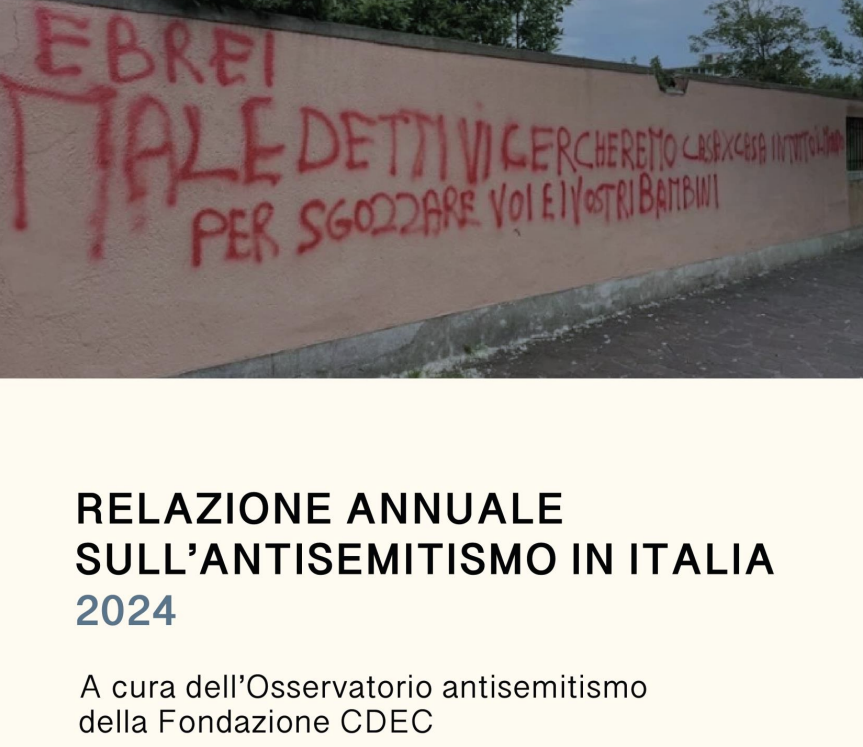ANTISEMITISM – CDEC reports record increase in prejudice in 2024

“Anti-Semitism in Italy reached unprecedented levels.” This is the conclusion given of the Contemporary Jewish Documentation Center (CDEC) Foundation Anti-Semitism Observatory in its 2024 annual Report, which highlights an alarming increase in acts and expressions of hatred against Jews. The data reveal a reality in which anti-Semitism is not only growing in numbers but also becoming more aggressive and socially accepted.
Throughout 2024, the Observatory received 1,384 reports, 877 of which were classified as anti-Semitism incidents. This is almost double the number of incidents recorded in 2023 (454), indicating an unprecedented increase. Hatred manifests itself increasingly both online and offline, with 277 episodes in real life, from threats written on walls to Jewish buildings being vandalized to physical and verbal assaults.
The analysis shows that anti-Semitism finds fertile ground in a social context where economic fragility and a common sense of insecurity translate into resentment and conspiracy theories. The war in Gaza, which began after the Hamas massacres on October 7, 2023, amplified these phenomena, normalizing antisemitic rhetoric disguised as anti-Zionism. “70% of the episodes are attacks on Israel, in which a growing anti-Zionist narrative overlaps with historical prejudices against Jews,” pointed out sociologist Betti Guetta, who wrote the report with Stefano Gatti, Murilo Cambruso and Larisa Anastasia Bulgar. “The rise of these episodes reflects a broadening of the sources of Jew-hatred, which is becoming more generalized and no longer related to specific age groups“, explained Gadi Luzzatto Voghera, director of the Cdec Foundation.
Online hate
Social media continues to be the main vehicle for the spread of anti-Semitism. Compared to 2023, insults, death threats and the glorification of violence against Jews have grown. Particularly commons are slogans such as “From the river to the sea,” the distortion of the Shoah and the juxtaposition of Israel with Nazism. A concerning sign, the report states, is the use of these themes not only by extremist groups, but also by public figures and influencers. Digital platforms are struggling to tackle online hate effectively, despite obligations under the EU’s Digital Services Act (DSA).
Transversal phenomena
The report identifies some of the main ideological sources of anti-Semitism in Italy, including Christian and Islamic anti-Judaism, neo-Nazism and neo-fascism, general hatred and conspiracy theories, anti-Semitism related to Israel and conspiracy theories about Jewish power. The most common narrative links Israel and Zionism to racism, imperialism, and colonialism. “But it is not just radical Islam, the far left or neo-fascists. The problem is that after 7 October, anti-Semitism has become a common narrative, used as an ideological tool to attack Israel and legitimize hatred of Jews,” Gatti explains. This paradigm has found new life in student protests and antagonistic movements, where an ever-increasing hostility towards Jews, often disguised as political activism, has been observed
Impact on Jewish life
One of the gravest aspects is the impact on the lives of Italian Jews. In universities and schools, students have faced pressure, exclusion, and attacks, leading them to hide their Jewish identity. “Threats in school, protests with violent slogans and social isolation make the daily life of members of the Jewish community very difficult,” said Guetta. “Schools and universities have become centers of tension, with student occupations and pro-Palestine demonstrations favouring the spread of antisemitic rhetoric,” added Gatti. According to the researcher, the media bears a lot of responsibilities. “They are increasingly polarised, and the information about Israel is often reduced to a conflict between ‘good’ and ‘bad’, without any space for critical reflection. Moreover, minority and aggressive positions such as small university groups against Israel are strongly amplified. This way the true scope of their message is blown out of proportion. “
The answers
Many initiatives have been taken in 2024 to counter this phenomenon, including educational programs aimed at students and teachers, courses and conferences. Furthermore, a review of the national strategy for the fight against anti-Semitism has been launched, involving the national Coordinator. “It is important to recognise the actions that have already been undertaken to combat anti-Semitism, avoiding the narrative that ‘nothing is being done’. The involvement of institutions and the implementation of a national strategy are fundamental steps.”, concluded Luzzatto Voghera.
Daniel Reichel
Translated by Chiara Tona and revised by Francesco Gambino, students at the Advanced School for Interpreters and Translators of the University of Trieste, trainees in the newsroom of the Union of the Italian Jewish Communities — Pagine Ebraiche.
